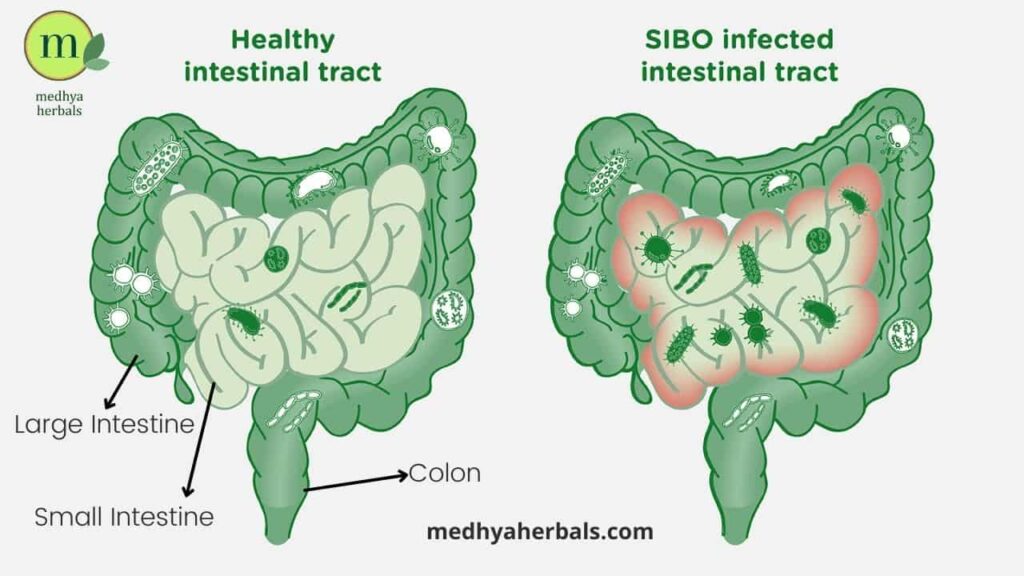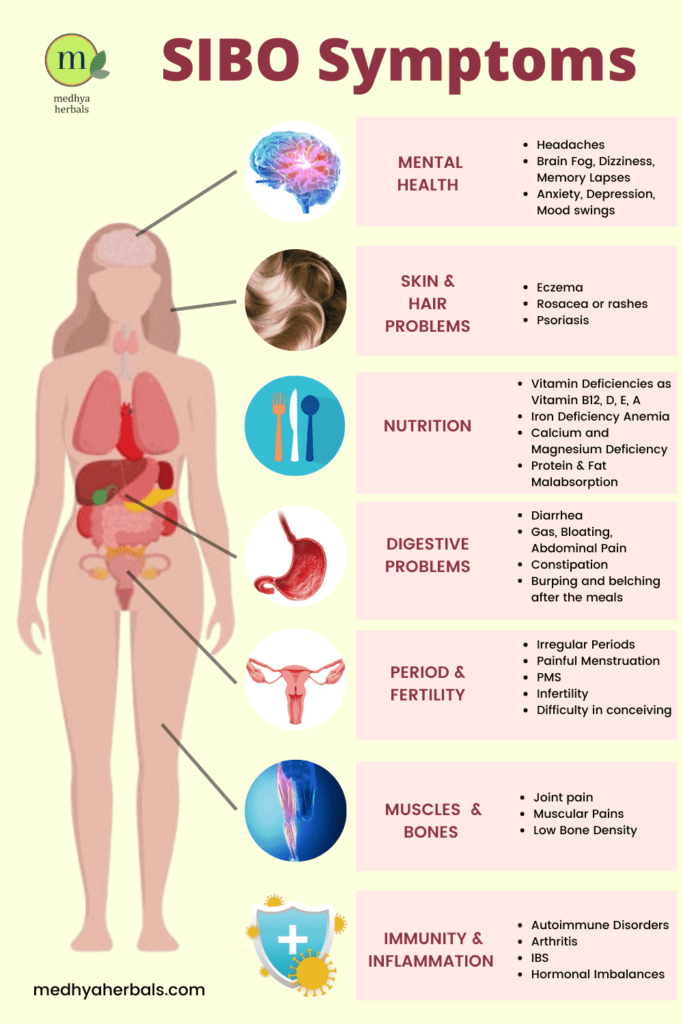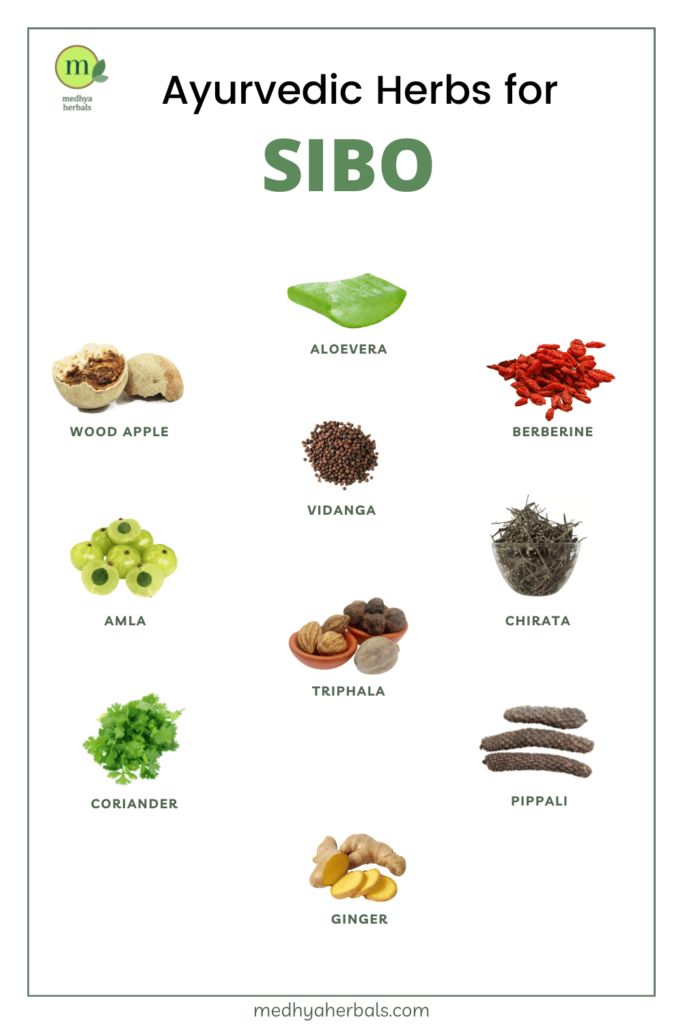Small Intestinal Bacterial Overgrowth (SIBO) is a complex gastrointestinal disorder in which there is bacterial overgrowth in your small intestines. A large majority of SIBO symptoms overlap with chronic digestive disorders as a leaky gut, IBS, Crohn’s Disease and Irritable bowel Disease.
That’s why, bacterial overgrowth and SIBO remains undetected in a large majority of patients who struggle with constant bloating, constipation, diarrhea, fatigue and abdominal distension.
If you are tired of the rounds of tests, antibiotics and diets to find relief from chronic digestive discomforts due to SIBO; then this post is for you!
Ayurveda is a holistic system of medicine that offers natural treatment to cure SIBO at the root cause level. Ayurvedic medicines, diet and lifestyle can help you to reset your gut microbiome and flush out the harmful bacteria that’s triggering symptoms of SIBO.
In this blog post, we will go through Ayurvedic treatment for SIBO and get into the details of the symptoms and causes of bacterial overgrowth in small intestines. We will also cover the best Ayurvedic medicines for bacterial overgrowth, herbal supplements, foods and lifestyle options to permanently cure SIBO and support your gut health. Let’s begin!
What is SIBO?
Small intestinal bacterial overgrowth (SIBO) is a condition where there is too much bacteria in the small intestine. This happens when different types of bacteria that are not usually found in the small intestine start to grow there.

Normally, the small intestine hosts a relatively small number of bacteria – around 1000 to 10 000 per mL of content. On the other hand, the large intestine, specifically the colon has around 100 trillion bacteria per mL of content.
Usually the regular peristalsis (internal movement of intestines that moves the food inside) and the specific pH levels obtained from mixing of stomach acid, bile juice and the digestive enzymes keep the intestines free of harmful bacteria.
What happens in Small intestinal bacterial overgrowth (SIBO)?
When the bacterial populations in the small bowel exceed the normal, it can lead to a range of health symptoms including bloating, abdominal pain and distension, diarrhea, constipation, fatigue, and weight loss. More often than not, SIBO symptoms overlap with Irritable Bowel Syndrome (IBS), Leaky Gut and a host of other digestive tract disorders.
Small intestinal bacterial overgrowth can cause excessive gas production and distended belly. This is because harmful bacteria release gases as they feed on the matter in the intestines. The small intestine was not designed to withstand this, thus the gases tend to get trapped. This can cause nausea from slowed stomach emptying.
Additionally, the bacterial overgrowth in the small intestines damages mucosal lining and tiny villi. This further aggravates poor digestion and impairs the immune system response that works in the small intestine. Thus, one can become prone to food allergies, sensitivities and chronic inflammation or autoimmune diseases.
What Causes SIBO?
There are many possible causes of Small intestinal bacterial overgrowth, including:
1. Malfunctioning of the ileocecal valve
Due to damage or malfunctioning of the ileocecal valve (the valve that separates the large intestine from the small intestine), the bacteria in the large intestine can move to the small intestine. This migration of bacteria into the small intestine disturbs the natural and delicate balance of bacterial population in the small intestine.
2. Slow Intestinal motility (gastroparesis)
Slow motility of the small intestine (gastroparesis) can lead to SIBO in a few ways. First, when the intestines move slowly, food sits in the stomach for a longer time. This gives bacteria more time to grow and multiply. Second, slow motility can cause changes in the pressure inside the small bowel.
These changes can make it easier for bacteria to move from the large intestine into the small intestine. Finally, slow motility can cause changes in the structure of the intestinal wall. These changes make it easier for bacteria to attach to the wall and invade the small bowel.
3. Medications as Proton Pump Inhibitors
The use of certain medications, such as antibiotics, antacids or proton pump inhibitors (PPIs) can cause bacterial growth and SIBO in multiple ways. These medications kill the good bacteria that normally live in the intestine.
They also affect the acidity of the stomach, leading to chronic low acid levels. This allows bad bacteria to grow and multiply.
4. Medical conditions of Small Intestine
Celiac disease, Crohn’s Disease or other conditions that damage the lining of the small intestine cause SIBO by allowing bacteria to enter the small intestine.
When the lining of the intestine is damaged, it becomes easier for bacteria to attach to the wall and invade the small intestine. The bacteria can also enter through tiny openings in the intestinal wall. These openings are called a “leaky gut.”
5. Low Gastric Acid, Digestive Enzymes or Poor Bile Flow
Stomach Acid, digestive enzymes and bile all play a key role in providing right environment to break down the food and hence availability of nutrients from it. All of these are highly concentrated in nature, hence act as antimicrobials to ward off bad bacteria growth in small intestine.
Our digestive juices also stimulate peristalsis in the intestinal tract. Thus, someone with insufficient digestive juices will also struggle from sluggish bowels and constipation problems.
Having a sluggish liver, stomach or gallbladder function can lead to low digestive juices flow and promote SIBO in the small intestine.
6. Stress
Stress can damage the digestive tract in a number of ways. It can lead to slow digestion, toxin build-up and inflammation, thus increasing permeability of intestines.
This allows bacteria to enter the bloodstream. Stress also slows immune system response, thus allowing growth of harmful bacteria in the unnatural locations as the small intestine.
From an Ayurvedic perspective, stress induces irregular flow of “Samana Vata dosha” leading to damaged ileocecal valve. This allows for the bacteria to move into the small intestine.
7. Structural Problems and Surgeries
Some problems in the structure of the intestine such as a kinking of the intestines (blind loop syndrome), an impasse or strictures from abdominal surgeries (hernia, C-section, appendectomy, endometriosis, etc.), and connective tissue disorders can lead to potentially weak sections. These issues affect the motility of the intestines and give a chance to bad bacteria to flourish.
Symptoms of SIBO

Ideally, small intestine is the place, where food is broken down and nutrients are absorbed into the blood stream.
That’s why bacteria overgrowth can make it hard for your body to digest food and get the nutrients you need. This can damage the lining of your intestine. The bacteria can also enter your bloodstream and trigger symptoms related to fatigue, pain and mood swings.
SIBO symptoms related to poor digestion
- Diarrhea
- Gas, Bloating, Flatulence
- Constipation
- Irregular Appetite, feeling full without food or getting immensely hungry a moment afterwards
- Fatigue
- Weight loss or weight gain
- Vitamin and Mineral Deficiencies as Vitamin B12, D, E, A
- Iron Deficiency Anemia
- Poor Calcium absorption
- Burping and belching after the meals
- Abdominal Pain & Distention
- Nausea, Acid Reflux, GERD
- Bile salt malabsorption
SIBO symptoms related to inflammation
Presence of excess bacteria interferes with normal functioning of your immune system and liver function too. This further leads to bad liver health and poor immunity.
These bacteria also excrete acid and gases, which can cause neurological and cognitive problems, thus creating symptoms of poor brain function, brain fog, and memory lapses.
- Headaches
- Brain Fog, Dizziness, Memory Lapses
- Anxiety, Depression, Mood swings
- Joint pain, Muscular Pains
- Eczema, rosacea or rashes
- Hormonal Imbalances
- Sinus congestion
- Difficulty in urination
- Vaginal or rectal itching
Health Complications and Risk Factors of SIBO
Small Intestinal Bacterial Overgrowth (SIBO) can interrupt both digestion and absorption of vital nutrients like iron and fat soluble vitamins, leading to symptoms of digestive disorders and feeling low in every manner. Chronic SIBO can turn into massive inflammation and hence trigger autoimmune disorders.
If you think you may have SIBO, it’s important to see a doctor for diagnosis and treatment.
1. Poor absorption of Fats, Carbohydrates, and Proteins
Bile salts and gastric acid help to digest the fats that were broken down by your small intestine. When something is not digested properly, it affects the mucous lining of the small intestine.
This can lead to poor absorption of fats, carbohydrates, and protein. Not being able to absorb these things can also lead to diarrhea and other conditions like nutritional deficiencies and weight loss
2. Vitamin Deficiency
The body can’t absorb all the vitamins from fat when it isn’t completely digested. Some of these vitamins are important, like vitamin A, D, E, and K. Vitamin B-12 is also very important for the body. It helps keep our nervous system working well and makes blood cells and DNA.
The bacteria in our gut need B-12 to survive, and a lack of it can lead to weakness, fatigue, and numbness in the hands and feet. If someone doesn’t get enough B-12 for a long time, it can cause damage to their central nervous system that might be irreversible in some cases.
3. Weak Bones and Osteoporosis
Osteoporosis is a disease that can be caused by a lack of calcium. When the intestine is damaged or there are too many bacteria, it can stop your body from absorbing calcium properly.
This can lead to bone diseases like osteoporosis and also affect the function of kidneys, leading to kidney stones.
How is SIBO Diagnosed?
Hydrogen breath testing is the most common way to diagnose SIBO. In this test, you will be asked to drink a sugar-water solution. Then, you will undergo breath testing for hydrogen and methane at regular intervals.
If SIBO is present, the bacteria in your intestine will break down the sugar and release hydrogen and methane into your bloodstream. These gases will then be absorbed by your lungs and exhaled when you breathe out.
Your doctor may also use breath testing to diagnose SIBO. In this test, you will drink a sugar solution. If SIBO is present, the bacterial metabolism will release hydrogen and methane into your bloodstream. Your doctor may also use a stool test to diagnose SIBO. In this test, a sample of your stool will be tested for the presence of bacteria.

SIBO Ayurvedic Treatment
Ayurveda is an ancient system of medicine from India that uses a holistic approach to treat the whole person rather than just the symptoms of disease. Ayurveda views gut health as the foundation of overall health and well-being, and therefore, SIBO is considered a serious condition in Ayurvedic medicine.
Ayurvedic treatment for SIBO focuses on detoxifying the gut, in specific the small intestines to get rid of the harmful bacteria, healing the gut biofilm (lining), supporting immune system to reduce inflammation and re balancing the gut flora so that SIBO relapse doesn’t happen in future.
Antimicrobial Ayurvedic medicines, digestive herbs and spices, yoga, pranayama, and dietary changes are all part of the ayurvedic approach to treating gut health. Ayurveda offers an effective approach to treating SIBO and other functional gastrointestinal disorders.
Ayurvedic treatment for SIBO is customized to the individual’s needs, thus looking into one’s specific symptoms and hence providing appropriate protocol for treating SIBO naturally.
Here’s how Ayurvedic Treatment for SIBO works:
- Ignite the digestive fire for optimal digestion with digestive herbs, spices and yoga
- Starve and kill harmful bacteria with antimicrobial herbs
- Flush out microbial infestation and toxin build up in the body
- Restore healthy gut function: secretion of digestive juices, gut motility and a healthy gut lining
- Support healthy balance of normal bacteria in the intestines through diet and lifestyle
- Intake of rejuvenating Ayurvedic medicines and Ayurvedic diet for balanced nutrition and strength in the body
1. Ayurvedic Medicines for SIBO Treatment
Herbal medicines, antimicrobials and antibacterials are used in Ayurvedic treatment for SIBO. These herbs are typically taken in the form of teas, tinctures, or capsules.

Some of the most effective Ayurvedic herbal medicines for SIBO include:
- Triphala churna powder
- Manjistha
- Neem
- Oregano Oil
- Vidanga
- Ginger
- Pippali
- Coriander
- Chirata
- Amla
- Wood Apple
- Berberine
- Aloe vera
2. Ayurvedic Diet for SIBO Treatment
The Ayurvedic diet is an important part of treatment for SIBO. The diet includes plenty of fresh fruits and vegetables, as well as fermented foods such as yogurt and kombucha. Foods that are high in fiber are also encouraged, as they help to promote gut health.
- Fresh vegetables and fruits are a great source of antioxidants, vitamins, minerals, and other phytonutrients which can help protect the gut from damage caused by inflammation.
- Whole grains such as rice, barley and millets are high in fiber and act as prebiotics to support the balance of healthy gut bacteria.
- Healthy fats such as olive oil, coconut oil, and ghee are beneficial for the gut as they help to keep the intestinal biofilm healthy and protect it from damage.
- Herbs and spices such as cardamom, cumin, fennel, coriander, turmeric, and parsley have anti-inflammatory and healing properties which can help to improve gut health.
- Khichari meals are simple and easy to digest and are a great way to get all the nutrients your body needs.
- Foods that should be avoided include dairy products, processed foods, sugar, and alcohol.
- Bacteria primarily feed off of sugars and starches in the diet (both refined sugars and natural sugars). So it is essential to eliminate all refined sugars from the diet and most starchy foods.
3. Yoga and Regular Exercise

Yoga is a mind-body exercise that connects the body and mind, and it can help to restore balance in the body. It is a great way to reduce stress and promote relaxation.
There are many yoga poses that can help to improve digestion and elimination functions. They improve circulation to the gut, which can help to promote healing.
The yoga poses that are most beneficial for gut function are those that stretch and massage the abdominal area. These poses help to stimulate digestion and improve gut health.
Some examples are:
- Cat-cow pose
- The downward-facing dog pose
- The cobra pose
- Half Lord of the Fish Pose
- Extended Side Angle Pose
- Frog Pose
- Plow Pose
4. Healthy Lifestyle to Treat Small Bowel Bacterial Overgrowth
Ayurveda also recommends that we adopt a healthy lifestyle, which includes regular exercise and stress management techniques. A healthy lifestyle is essential for maintaining a healthy gut and preventing bacteria from from growing in the gut.
The key to Ayurvedic treatment for SIBO lies in living in harmony with nature by following the principles of ayurveda. These simple tips can help you get started on your journey to better health:
1. Eat according to your constitution
One size does not fit all when it comes to diet. What works for one person may not work for another. To find out what type of diet is best for you, consult an Ayurvedic practitioner.
2. Include spices in your diet
Spices not only add flavor to your food, but they also have medicinal properties. The best Ayurvedic spices for gut health include turmeric, ginger, cumin and fennel.
3. Abhyanga: Massage with Medicated Oils
Massage is an important part of Ayurvedic medicine. It helps to improve circulation, detoxify the body and relax the mind.
4. Exercise regularly
Exercise helps to strengthen the body and reduce stress levels. Yoga is a particularly good form of exercise for those following an Ayurvedic lifestyle.
5. Hydration
Drink plenty of water to help flush out bacterial overgrowth and toxins from the gut.
6. Reduce stress
Stress can have a negative impact on your health. Try to find ways to relax and reduce stress in your life. Meditation, yoga and deep breathing are all good methods for reducing stress.
7. Getting enough sleep
Getting enough sleep is essential for gut health and overall health and well-being.
By following these simple tips, you can tremendously improve your gut health, improve your digestive system health and prevent bacterial overgrowth syndrome.
Consult with an Ayurvedic practitioner to find out more about how you can benefit from Ayurveda to treat small intestinal bacterial overgrowth.
Proper Elimination & Regular Bowel Movement for SIBO Treatment
Ayurveda has a very strong focus on the importance of proper elimination and regular bowel movement for the health of our gut. According to Ayurveda, when we have a healthy gastrointestinal tract, it is reflected in our skin, hair and overall sense of well-being.
Ayurveda recommends that we eat freshly prepared food that is mixed with various digestive spices to help keep our gut healthy. The concept of eating locally available and seasonal ingredients also helps in improved digestion and elimination functions.
Fresh and seasonal produce not only have great flavour, they also have better concentration of anti-oxidants, nutrients and life force in them than those which are stored in cold storage.
Spices like turmeric, mustard seeds, asafetida, black cumin, ginger, garlic etc. which are commonly used in Ayurvedic cuisine are also proven to have strong anti-cancerous properties.
Takeaway!
Removing bacterial overgrowth is not something that happens overnight or in a 21-day program. Re balancing of the gut microbiome can take up to a year or two, and often requires multiple courses of treatment with Ayurvedic medicines to maintain a healthy gut flora.
Diet and lifestyle help to support gut health, but in most cases, long term healing from SIBO requires removing small intestinal bacterial overgrowth with a really comprehensive natural treatment protocol, that is more than just diet or antibiotics (herbs and medicines).
If you are suffering from small intestinal bacterial overgrowth (SIBO), it is important to seek out professional help in order to receive the best possible treatment. However, do begin to support your gut health and reduce SIBO symptoms by making simple lifestyle changes and incorporating some of the above-mentioned therapies into your daily routine.
At Medhya Herbals, we offer personalized Ayurvedic treatment plans to help you manage your SIBO symptoms and improve your overall health and wellness. Our team of experts can work with you to develop a customized plan that addresses your specific needs and preferences. Whether you’re looking for natural remedies for SIBO or seeking a more holistic approach to health and wellness, we’re here to support you on your journey. Contact us today to schedule a consultation and start your journey towards freedom from SIBO.
FAQ
1. Can SIBO cause IBS symptoms?
There is a strong correlation between SIBO, IBS ( Irritable Bowel Syndrome) and Inflammatory Bowel Disease. Current research indicates that SIBO can actually cause IBS, especially in females and elderly patients.
Typical symptoms of IBS are diarrhoea, constipation or alternating constipation and diarrhoea, abdominal pain, gas and bloating. These symptoms overlap with that of intestinal bacterial overgrowth SIBO.
2. What is the best and fastest way to treat SIBO?
Everyone may have different underlying factors that are contributing to SIBO. Causes and factors that lead to bacterial overgrowth indicate some of the most possible triggers for SIBO in your body.
Getting rid of SIBO is not as easy as just taking a round of antmicrobials or antibiotics for SIBO. Especially for anyone who has a problem with imbalance of bacterial flora due to low levels of gastric acid and bile flow. SIBO often returns for those who never addressed the root cause factors in their SIBO healing protocol.
That’s why the best and fastest way to prevent SIBO from occurring or reoccurring is to have identify the root cause of bacterial overgrowth in your specific case and then take a systematic approach to optimise your digestive system function, heal the gut and flush out bacteria from the gut.
3. Can SIBO cause Weight loss?
Small bowel bacterial overgrowth (SIBO) can disturb both digestion and absorption of nutrients, specifically for fat soluble vitamins such as Vitamin B12, D, E and A and for minerals as Iron, Magnesium and Calcium.
Symptoms of SIBO can range from bloating, gas, diarrhea, or chronic constipation. These symptoms occur when the bacteria of the small intestine feed on the nutrients that the small intestine is supposed to be sending into the bloodstream. The result is continued bacterial overgrowth in the smaller bowels.
When SIBO has been ongoing for a long time, it can actually result in weight loss because the bacteria are consuming too many nutrients and not enough are being absorbed, leading to malnutrition. It can also lead to unexplained fatigue, aches and pains, and other chronic conditions that can be misdiagnosed in place of SIBO, like IBS (Irritable Bowel Syndrome).
References
Herbal Therapy for the Treatment of Small Intestinal Bacterial Overgrowth
Prebiotic Potential of Herbal Medicines Used in Digestive Health and Disease


I found it great information, where can we get tested for SIBO, Gastroenterologist tested and said I have. It’s not normal with all the food restrictions.
Whom can we contact for proper testing treatment in Ayurveda
Hi! We can help you out with Ayurvedic diagnosis of your digestive problems. Ayurvedic diagnosis works in terms of strength of your digestive fire, balance of your dosha and quality of dhatu – your body tissue. Based on diagnosis, we provide Ayurvedic treatment consisting of herbal medication prescription, diet plan, yoga and lifestyle guidelines. You can whatsapp us at +6581286582 or schedule a consultation here: https://medhyaherbals.com/ayurvedic-treatment/
Thank you. Very informative. I am suffering from all the symptoms noted in the topic. How to contact for treatment please advise.
Hello! Please whatsapp at +6581286582 or email us at health@medhyaherbals.com. We will be happy to guide you. Take care!
Sibo
sir
send me address
i will come
Hello! Please email us at health@medhyaherbals.com or whatsapp at +6581286582 for more information. Thank you.